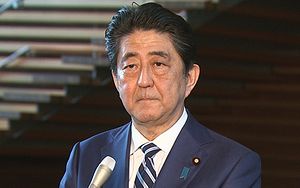As we know, the United States has a novel interpretation of the right of self-defense; essentially, it believes that the long-term threat posed by North Korea can justify an attack, even absent any direct, specific, immediate threat. How does Japan view this “self-defense” justification for giving North Korea a “bloody nose?”
Even with recent diplomacy, the situation in Northeast Asia remains tense. The Trump-Kim summit meeting may happen; less likely, it might produce results which would significantly decrease regional tensions. Similarly, Shinzo Abe’s apparent openness to meeting Kim could make put the bilateral DPRK-Japan relationship onto stronger footing. But if the summit fails, the “bloody nose” option may find its way back onto the menu. Indeed, some have argued that Trump will use the failure of the negotiations as pretext for a more aggressive approach.
Masahiro Kurosaki, Director of the Study of Law, Security and Military Operations at the National Defense Academy of Japan Ministry of Defense, has recently contributed an essay to Lawfare arguing that Japan’s perspective on international law severely curtails its potential actions in case of an American attack. Kurosaki makes three policy points: Japan is unlikely to react to a North Korean missile flying through its airspace by exercising its right to self-defense; the United States cannot unilaterally act on Japan’s behalf; if Japan responds, it will likely attempt to destroy the missile rather than the launcher.
As a matter of international law, Japan has rejected not only anticipatory self-defense, the doctrine that enables the United States to attack countries posing a temporally distant threat, but also pre-emptive strikes. This would make it difficult to launch direct attacks against North Korea unless the latter began hostilities at a significant level. Moreover, questions of offense and defense have been complex for Japan since the end of World War II. Although Japan’s military forces are officially limited to self-defense, most countries interpret “defense” as allowing certain kinds of attacks against enemy territory. Kurosaki doesn’t take on this debate directly, although he notes that Japanese interpretation of international law limits the means by which Japan can respond to minor incursions.
Nevertheless, Kurosaki acknowledges that the United States may attack North Korea anyway. In this case, Tokyo would need to finesse the difficulties presented by U.S. forces operating from Japanese soil. Japan might also come under attack from North Korean ballistic and cruise missiles; even if these missiles targeted U.S. installations, Japanese civilian areas would be at risk. In such an event, Japan could at least respond with defensive weapons intended to intercept such attacks.
U.S. policy in Northeast Asia is completely predicated upon the defense of allies. North Korea’s sole interest in threatening the United States is founded upon the U.S. relationships with South Korea and Japan. Nevertheless, the Trump administration has decided to rhetorically investigate a policy that neither Seoul nor Tokyo can genuinely support. It remains to be seen whether Trump can navigate the hazards presented by both adversaries and allies in his upcoming negotiations with Kim Jong-un.

































